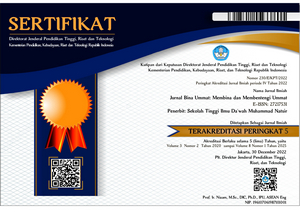DA'WAH STRATEGIES TO INCREASE THE UNDERSTANDING OF FARAIDH SCIENCE IN SOCIETY
STRATEGI DAKWAH UNTUK MENINGKATKAN PEMAHAMAN ILMU FARAIDH DI MASYARAKAT
DOI:
https://doi.org/10.38214/jurnalbinaummatstidnatsir.v4i2.111Keywords:
Da'wah, Faraidh Science, Society, Islamic Inheritance LawAbstract
This study aims to analyze the implementation and constraints that affect the application of Islamic inheritance law among Muslims. This research is a qualitative research, using the methods of descriptive approach, sociology, normative theology and historical. Research shows that the implementation of Islamic inheritance law is more dominantly done in the family due to various factors. The special portion provided for the heirs is owned by the parents and is in absolute control. The application of the law for the division of property is always done by distributing it to the heirs by family without looking at the provisions of God's law. Problems in the application of Islamic inheritance law include the thickness of customary law and the low understanding of Islamic inheritance law (Ilmu Faraidh). Here the da'wah to teach the Science of Faraidh and various sciences of jurisprudence that began to understand the science of Faraidh became a must done by the community. And there is a need for systematic strengthening of da'wah so that knowledge is understood in a kaffah manner so that the application of maqashid syariah becomes more comprehensive.
Published
Issue
Section
This work is licensed under a Lisensi Creative Commons Atribusi 4.0 Internasional.
Authors who publish with this journal agree to the following terms:
- Authors retain copyright and grant the journal right of first publication with the work simultaneously licensed under a�Creative Commons Attribution License that allows others to share the work with an acknowledgment of the work's authorship and initial publication in this journal.
- Authors are able to enter into separate, additional contractual arrangements for the non-exclusive distribution of the journal's published version of the work (e.g., post it to an institutional repository or publish it in a book), with an acknowledgment of its initial publication in this journal.
- Authors are permitted and encouraged to post their work online (e.g., in institutional repositories or on their website) prior to and during the submission process, as it can lead to productive exchanges, as well as earlier and greater citation of published work (See�The Effect of Open Access).




